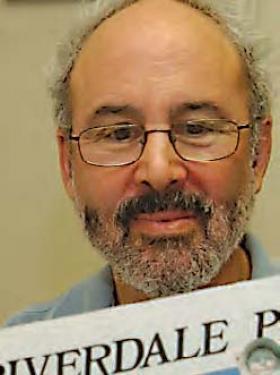Remembering the adventure
By Bernard L. Stein.
Editor and Co-publisher, 1978-2005
One day in March 1950, my father set up a well-used wooden drawing board in the bedroom of Apartment 63A at 3900 Greystone Avenue. Next to it he placed a small table to hold a heavy upright typewriter. Each evening, when he returned home from his job as an editor at The Associated Press and every weekend, he pounded on the typewriter with two fingers of each hand or sketched advertisements with a T-square and triangle.
A few weeks later, my mother opened the legs of a round folding card table, and placed it in the center of our living room. At each seat, she placed a little dish holding a damp, round sponge.
I still remember how excited I was to join a group of our neighbors from 3900 around that table - to be included with the grownups on an occasion that I knew was momentous. My mom placed stacks of gummed labels in front of each of us. Then she brought in 3,000 copies of the first issue of The Riverdale Press, enough to arrive in every mailbox in the area. We moistened each address label on the sponge and applied it to the little eight-page newspaper, just big enough to fit in four pages of today's Press.
Over the next six decades, as Riverdale grew and changed, its newspaper grew and changed with it. For half of that time, I served as its editor. It was an unusually adventurous tenure.
The Press was the first paper in the city to reveal the corruption of community school boards, in exposés that led to a scathing grand jury report and the first legislation aimed at curbing the political prostitution of teachers and school administrators.
The entire leadership of the Bronx Democratic Party went to jail during my time in the newsroom, and we helped put some of those men behind bars.
Terrorists bombed the Press office to retaliate for an editorial defending the right to read Salman Rushdie's novel The Satanic Verses.
Press investigations of how the largest medical waste incinerator in the state came to be built in the Bronx led a federal grand jury to indict a community board chairman, sparked a Congressional hearing and ultimately forced the state to dismantle the incinerator.
I won a Pulitzer Prize.
The seeds of all of those trials and achievements were planted around that card table on Greystone Avenue, a circle that linked the enduring sources of this newspaper's strength: the courage and talent of David Stein, who left his secure job at AP to serve his community; the devotion of Celia Stein; and the support of neighbors.
The mutual support of Riverdalians for their newspaper and the newspaper for its community continues to strengthen both newspaper and community. It makes Riverdale a place people are proud to live in.
In classes at Hunter College and at the City University Graduate School of Journalism, where, as a professor, I guide my students in putting out newspapers to serve two neighborhoods in the South Bronx, I teach what my father, and what you, The Press's readers, taught me: that a community newspaper can knit a community together, helping neighbors to share their concerns and helping them to act for the common good. I pass on the lesson that democracy depends on the participation of citizens, and I share my pride in this forum for exchanging information and encouraging debate that now embarks on its seventh decade.






